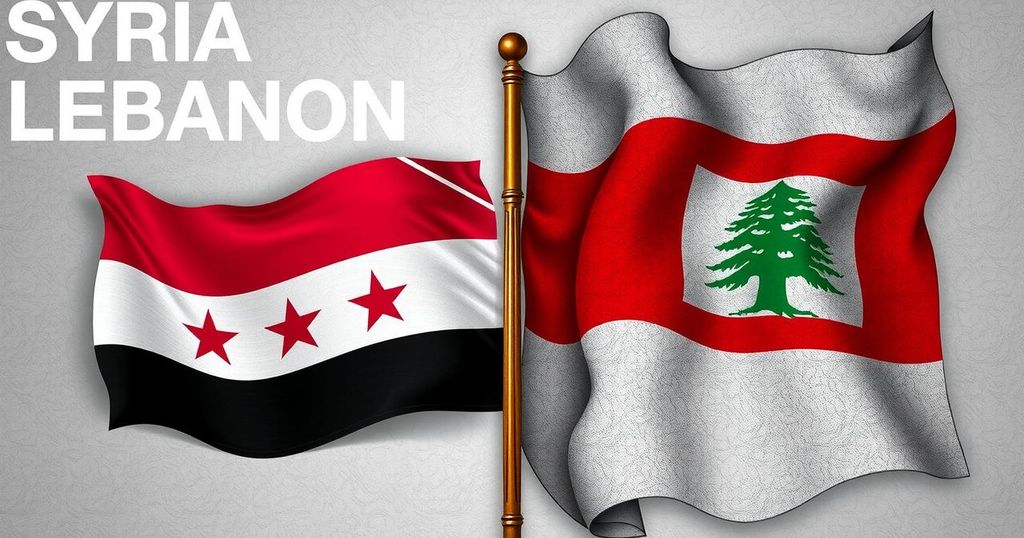New Hope for Syrian-Lebanese Relations: Leaders Forge Stronger Ties

Syria’s new leader and Lebanon’s Prime Minister Mikati pledged to strengthen ties, marking the first visit by a Lebanese premier since the onset of the Syrian Civil War. The leaders aim to address critical issues such as the repatriation of Syrian refugees and border demarcation to improve bilateral relations, emphasizing mutual respect and cooperation amidst a changing political landscape.
Syria’s new leadership and Lebanon’s Prime Minister Najib Mikati convened in Damascus, emphasizing a commitment to establishing solid bilateral relations for the first time since the onset of the Syrian Civil War in 2011. This historic visit follows a significant shift in power in Syria, with Mikati expressing mutual respect and sovereignty as the foundation for future ties. The leaders discussed the urgent need to resolve long-standing issues, including the repatriation of approximately two million Syrian refugees currently in Lebanon, which has become a pressing concern amid Lebanon’s ongoing economic crisis. They also addressed the importance of delineating land and maritime borders to foster economic cooperation, particularly in light of Lebanon’s ambitions for offshore gas exploration.
Sharaa articulated aspirations for a fresh beginning in Syrian-Lebanese relations, indicating a desire to cultivate strategic partnerships that would benefit both nations. He remarked, “There will be long-term strategic relations between us and Lebanon. We and Lebanon have great shared interests.” This sentiment was echoed by Mikati, who highlighted overseeing border security to combat smuggling and promote stability in the region.
These discussions represent a significant thaw in relations, which have historically been strained due to Lebanon’s complex political landscape and Hezbollah’s involvement in Syria. The new leadership dynamics in both countries present an opportunity for renewed collaboration and stability, contingent on the resolution of critical issues concerning refugees and border demarcation.
The Syrian Civil War, which began in 2011, has resulted in widespread humanitarian crises, with millions of Syrians fleeing to neighboring countries, particularly Lebanon. For decades, Syria exerted considerable influence over Lebanon, culminating in a military presence that lasted until 2005. The political landscape shifted drastically following the civil war, complicating diplomatic relations. Hezbollah’s alliance with the Assad regime has sparked domestic tensions in Lebanon, where many have opposed such support. With the recent election of President Joseph Aoun amid Lebanon’s protracted political stalemate, and the ousting of Bashar al-Assad from power, both nations appear poised to mend ties that have been fraught with difficulty. The return of Syrian refugees remains a critical issue for Lebanon, particularly given the significant economic turmoil that the country has faced since 2019. Thus, Prime Minister Mikati’s visit is seen as a potential turning point towards improved relations and practical cooperation. Attempts to delimit borders and establish control over smuggling routes further underscore the necessity for structured dialogue between the two countries. Economic cooperation, particularly in energy exploration and security, forms a backdrop to these political negotiations that could shape the future of both nations.
The meeting between Syria’s new leadership and Lebanon’s Prime Minister symbolizes a pivotal moment in their historically fraught relationship. Both leaders aim to establish constructive ties focused on mutual interests, particularly addressing pressing concerns such as the return of Syrian refugees and the delineation of borders. By prioritizing strategic cooperation and enhanced dialogue, they hope to lay down a framework that fosters stability and prosperity in a region that has endured prolonged periods of conflict and distress.
Original Source: www.wnbjtv.com








